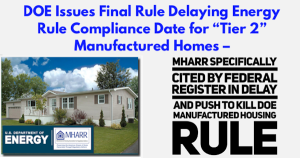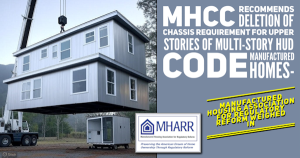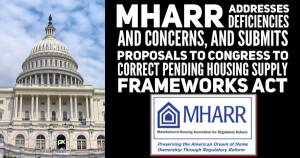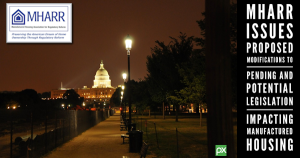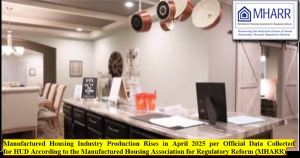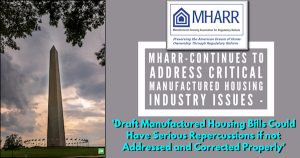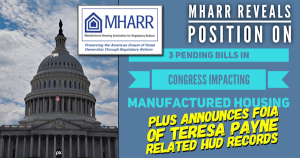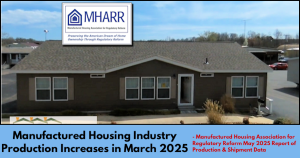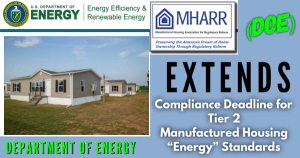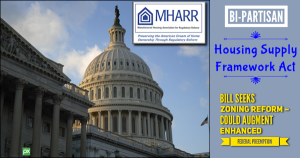Ginnie Mae Seeks Input on FHA Title I Manufactured Housing Program and Egregious 10-10 Rule
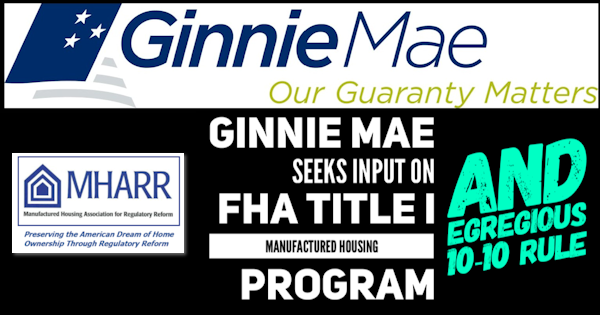
Following an MHARR meeting with senior Government National Mortgage Association (Ginnie Mae) officials on February 10, 2022 to address the near-collapse of the Federal Housing Administration (FHA) Title I manufactured housing program and the role of Ginnie Mae’s egregious “10-10” rule in leading to that collapse, Ginnie Mae has now issued a Request for Input (RFI) (copy attached attachment 1–attachment 2) seeking comments from interested parties with respect to the revitalization of the Title I program and changes to “issuer eligibility requirements” (i.e., the 10-10 criteria).
As was noted in a February 14, 2022 MHARR memorandum concerning the Ginnie Mae meeting, that meeting followed a written MHARR request to then-newly confirmed Ginnie Mae President, Alanna McCargo, to “either repeal or reform” the 10-10 rule, which “for more than a decade has severely restricted utilization of the Title I program for manufactured home personal property … loans.” During the meeting, “MHARR’s representatives stressed that “given President Biden’s stated commitment to supporting the availability of affordable housing for all Americans, as well as housing equity … the restrictive 10-10 rule, which benefits just [a few] large finance companies while excluding many others from participation in the FHA Title I program, is a failed policy relic that must be rescinded.”
And now, in its July 27, 2022 RFI, Ginnie Mae, as a threshold matter, admits – correctly, and as asserted by MHARR — that its Title I manufactured housing program is “uncompetitive in today’s market.” More importantly, though – and again consistent with MHARR’s stated position at the February 10, 2022 meeting – the RFI seeks specific input concerning “current issuer eligibility requirements” (i.e., the 10-10 rule) and “changes” to those requirements that “would expand the universe” of participating program lenders.
The issuance of the RFI, accordingly, is not only a direct outgrowth of persistent MHARR advocacy, but also tacit (if not, indeed, explicit) acknowledgment by Ginnie Mae of:
(1) the validity of MHARR’s position and assertions; and
(2) the absolute need for substantive change to the 10-10 rule and potentially other aspects of the Title I program in order to revitalize that program and advance President Biden’s affordable housing objectives.
In this regard, Ginnie Mae deserves credit for – at a minimum – recognizing the overriding importance of personal property/chattel lending to the HUD Code manufactured housing market and seeking to increase the availability of such financing, all of which stands in sharp contrast with the dithering and misdirection practiced by Fannie Mae and Freddie Mac under the statutory Duty to Serve mandate.
Again, given the importance of this matter, MHARR will submit responsive comments to the RFI, and urges other industry members to do the same in advance of the September 26, 2022 comment deadline. MHARR will use its best efforts to submit comments at an early date and make those comments available to industry members to utilize as they see fit. In its comments, MHARR will urge Ginnie Mae, among other things, to scrap the 10-10 rule and adopt program criteria that will promote full market-significant participation and competition within the Title I program, and urges other industry members to do likewise.
MHARR will continue to keep you advised on this matter as further developments warrant.
Manufactured Housing Association for Regulatory Reform (MHARR)
1331 Pennsylvania Ave N.W., Suite 512
Washington D.C. 20004
Phone: 202/783-4087
Fax: 202/783-4075
Email: MHARR@MHARRPUBLICATIONS.COM
Website: manufacturedhousingassociation.org
cc: HUD Code Industry Manufacturers
Attachments


Following an MHARR meeting with senior Government National Mortgage Association (Ginnie Mae) officials on February 10, 2022 to address the near-collapse of the Federal Housing Administration (FHA) Title I manufactured housing program and the role of Ginnie Mae’s egregious “10-10” rule in leading to that collapse, Ginnie Mae has now issued a Request for Input (RFI) (copy attached-attachment1–attachment2) seeking comments from interested parties with respect to the revitalization of the Title I program and changes to “issuer eligibility requirements” (i.e., the 10-10 criteria).
As was noted in a February 14, 2022 MHARR memorandum concerning the Ginnie Mae meeting, that meeting followed a written MHARR request to then-newly confirmed Ginnie Mae President, Alanna McCargo, to “either repeal or reform” the 10-10 rule, which “for more than a decade has severely restricted utilization of the Title I program for manufactured home personal property … loans.” During the meeting, “MHARR’s representatives stressed that “given President Biden’s stated commitment to supporting the availability of affordable housing for all Americans, as well as housing equity … the restrictive 10-10 rule, which benefits just [a few] large finance companies while excluding many others from participation in the FHA Title I program, is a failed policy relic that must be rescinded.”
And now, in its July 27, 2022 RFI, Ginnie Mae, as a threshold matter, admits – correctly, and as asserted by MHARR — that its Title I manufactured housing program is “uncompetitive in today’s market.” More importantly, though – and again consistent with MHARR’s stated position at the February 10, 2022 meeting – the RFI seeks specific input concerning “current issuer eligibility requirements” (i.e., the 10-10 rule) and “changes” to those requirements that “would expand the universe” of participating program lenders.
The issuance of the RFI, accordingly, is not only a direct outgrowth of persistent MHARR advocacy, but also tacit (if not, indeed, explicit) acknowledgment by Ginnie Mae of:
(1) the validity of MHARR’s position and assertions; and
(2) the absolute need for substantive change to the 10-10 rule and potentially other aspects of the Title I program in order to revitalize that program and advance President Biden’s affordable housing objectives.
In this regard, Ginnie Mae deserves credit for – at a minimum – recognizing the overriding importance of personal property/chattel lending to the HUD Code manufactured housing market and seeking to increase the availability of such financing, all of which stands in sharp contrast with the dithering and misdirection practiced by Fannie Mae and Freddie Mac under the statutory Duty to Serve mandate.
Again, given the importance of this matter, MHARR will submit responsive comments to the RFI, and urges other industry members to do the same in advance of the September 26, 2022 comment deadline. MHARR will use its best efforts to submit comments at an early date and make those comments available to industry members to utilize as they see fit. In its comments, MHARR will urge Ginnie Mae, among other things, to scrap the 10-10 rule and adopt program criteria that will promote full market-significant participation and competition within the Title I program, and urges other industry members to do likewise.
MHARR will continue to keep you advised on this matter as further developments warrant.
Manufactured Housing Association for Regulatory Reform (MHARR)
1331 Pennsylvania Ave N.W., Suite 512
Washington D.C. 20004
Phone: 202/783-4087
Fax: 202/783-4075
Email: MHARR@MHARRPUBLICATIONS.COM
Website: manufacturedhousingassociation.org
cc: HUD Code Industry Manufacturers
Attachments




